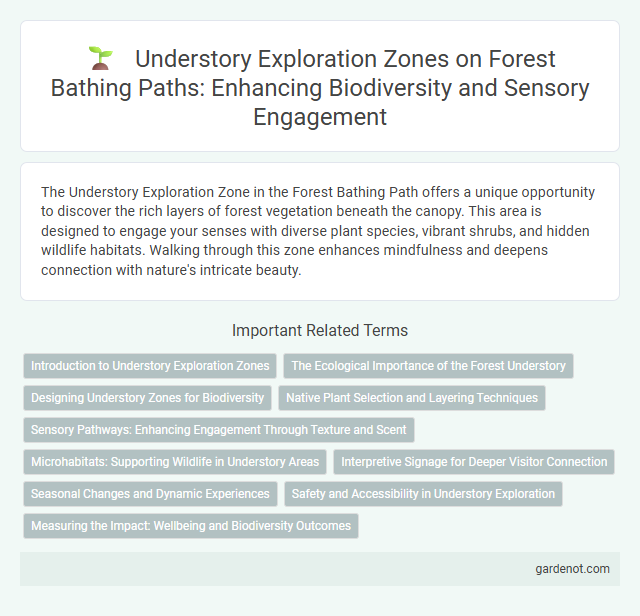The Understory Exploration Zone in the Forest Bathing Path offers a unique opportunity to discover the rich layers of forest vegetation beneath the canopy. This area is designed to engage your senses with diverse plant species, vibrant shrubs, and hidden wildlife habitats. Walking through this zone enhances mindfulness and deepens connection with nature's intricate beauty.
Introduction to Understory Exploration Zones
Understory exploration zones immerse visitors in the dense vegetation layer beneath the forest canopy, highlighting diverse shrubs, young trees, and rich biodiversity unique to this habitat. These zones provide insight into the ecological functions of the understory, such as habitat for wildlife, nutrient cycling, and forest regeneration. Engaging with the understory enhances understanding of forest dynamics and promotes mindful connection with nature's intricate layers.
The Ecological Importance of the Forest Understory
The forest understory plays a crucial role in maintaining biodiversity by providing habitat and food resources for numerous species, including insects, birds, and small mammals. This layer supports nutrient cycling and soil health through its diverse plant life, which stabilizes the ecosystem's microclimate and moisture levels. Protecting the understory enhances forest resilience against environmental stressors such as drought and disease.
Designing Understory Zones for Biodiversity
Designing understory zones for biodiversity involves selecting native shrubs, ferns, and shade-tolerant wildflowers to create diverse microhabitats that support pollinators, birds, and small mammals. Incorporating layered vegetation structures enhances nutrient cycling and soil moisture retention, contributing to overall forest health. Strategic placement of logs, leaf litter, and natural pathways facilitates species movement and fosters ecological connectivity within the forest bathing path.
Native Plant Selection and Layering Techniques
The Understory Exploration Zone features native plant selection tailored to local ecosystems, emphasizing species such as mountain laurels, ferns, and spicebush that thrive in shaded environments. Layering techniques incorporate ground covers, shrubs, and small trees to create diverse vertical habitats, enhancing biodiversity and ecological resilience. This approach fosters immersive sensory experiences while supporting pollinators and woodland wildlife within the forest bathing path.
Sensory Pathways: Enhancing Engagement Through Texture and Scent
The Understory exploration zone activates sensory pathways by integrating diverse textures and natural scents to deepen forest immersion. Visitors engage tactile senses through varied bark surfaces and mossy grounds, while aromatic notes from native plants stimulate olfactory receptors, enhancing mindfulness and connection to the environment. This multi-sensory approach fosters heightened awareness and emotional well-being during forest bathing experiences.
Microhabitats: Supporting Wildlife in Understory Areas
The understory exploration zone features diverse microhabitats crucial for supporting a wide range of wildlife, including insects, amphibians, and small mammals. Dense shrub layers, fallen logs, and leaf litter create sheltered environments that promote biodiversity and ecological balance. These microhabitats enhance the forest's resilience by providing food, shelter, and breeding grounds essential for sustaining understory species populations.
Interpretive Signage for Deeper Visitor Connection
Interpretive signage in the Understory Exploration Zone enhances forest bathing experiences by providing detailed information about native plant species, ecological roles, and seasonal changes. These educational signs foster a deeper connection by encouraging visitors to observe and appreciate the complex interactions beneath the forest canopy. Clear visuals and engaging narratives promote environmental awareness and support mindful, immersive nature walks.
Seasonal Changes and Dynamic Experiences
The Understory exploration zone reveals remarkable seasonal changes that transform the forest's character throughout the year, offering dynamic experiences for visitors. In spring and summer, vibrant foliage and blooming wildflowers create a lush, immersive environment, while autumn brings a rich palette of reds, oranges, and yellows that highlight the forest's biodiversity. Winter unveils the structural beauty of bare branches and subtle wildlife activity, enhancing the sensory depth of the forest bathing path.
Safety and Accessibility in Understory Exploration
The Understory Exploration zone features clearly marked trails and non-slip surfaces to ensure safety for visitors navigating uneven terrain. Accessibility measures include gently graded paths and strategically placed handrails to accommodate diverse mobility needs. Signage provides essential information on potential hazards and encourages mindful interaction with the natural environment.
Measuring the Impact: Wellbeing and Biodiversity Outcomes
The Understory exploration zone enables precise measurement of wellbeing improvements through immersive forest bathing experiences by tracking participant stress reduction and mood enhancement. Biodiversity outcomes are assessed via systematic monitoring of native plant species and insect populations, reflecting ecosystem health and resilience. Data integration from both human and environmental indicators supports evidence-based evaluations of the therapeutic and ecological benefits of forest bathing paths.
Understory exploration zone Infographic

 gardenot.com
gardenot.com